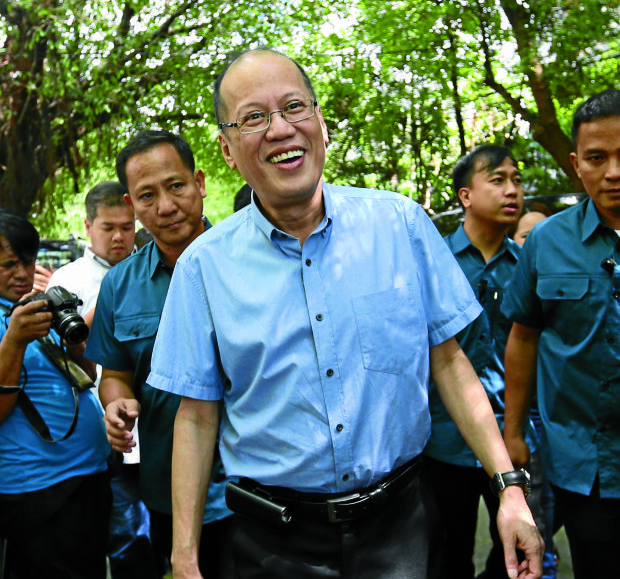
Former President Benigno Aquino leaving the venue of the Liberal Party meeting at Romulo’s cafe in Quezon City. EDWIN BACASMAS
A group of lawyers said on Wednesday they would file a motion for reconsideration appealing the Ombudsman’s decision clearing former President Benigno Aquino III of graft charges related to the use of the outlawed Disbursement Acceleration Program (DAP).
The National Union of People’s Lawyers or NUPL said it found the Ombudsman’s recent decision to indict only former budget chief Florencio Abad for usurpation of legislative powers and fine him for simple misconduct questionable.
Letting Aquino off the hook “creates an environment contrary to public accountability and adds to (the) culture of impunity,” said Cristina Yambot-Tanseco of NUPL.
“It signals to subordinates that they alone shall be responsible while the very principal who authored or authorized a particular policy found illegal by the court, remain unpunished,” Tanseco told the Inquirer.
Probable cause
Ombudsman Conchita Carpio Morales had excluded Aquino and Budget Undersecretary Mario Relampagos from her finding of a probable cause and administrative charge related to the DAP case. She also dismissed the complaint for graft and technical malversation against the two and Abad.
But Tanseco noted that the decision did not even discuss why Aquino was not held liable for usurpation of legislative powers unlike Abad.
“The decision is unacceptable to us and we will definitely ask for a reconsideration,” she added.
The 46-page decision dated March 3 explained that Abad usurped Congress’ power of the purse when he issued National Budget Circular No. 541 which effectively modified the definition of “savings” laid down in the 2012 General Appropriations Act.
In good faith
But the graft and technical malversation accusations did not prosper into court charges, because Aquino and Abad were deemed to have been in good faith when they started the program to spur economic growth by accelerating government spending.
The Supreme Court in 2014 declared that certain budgetary practices under DAP were unconstitutional. These include the cross-border transfer of funds and the declaration of savings before the end of the fiscal year in order to realign them for items not contained in the budget law passed by Congress.
As policy-makers, Aquino and Abad were not considered by the Ombudsman as the “accountable officers” of the funds under the definition of technical malversation.